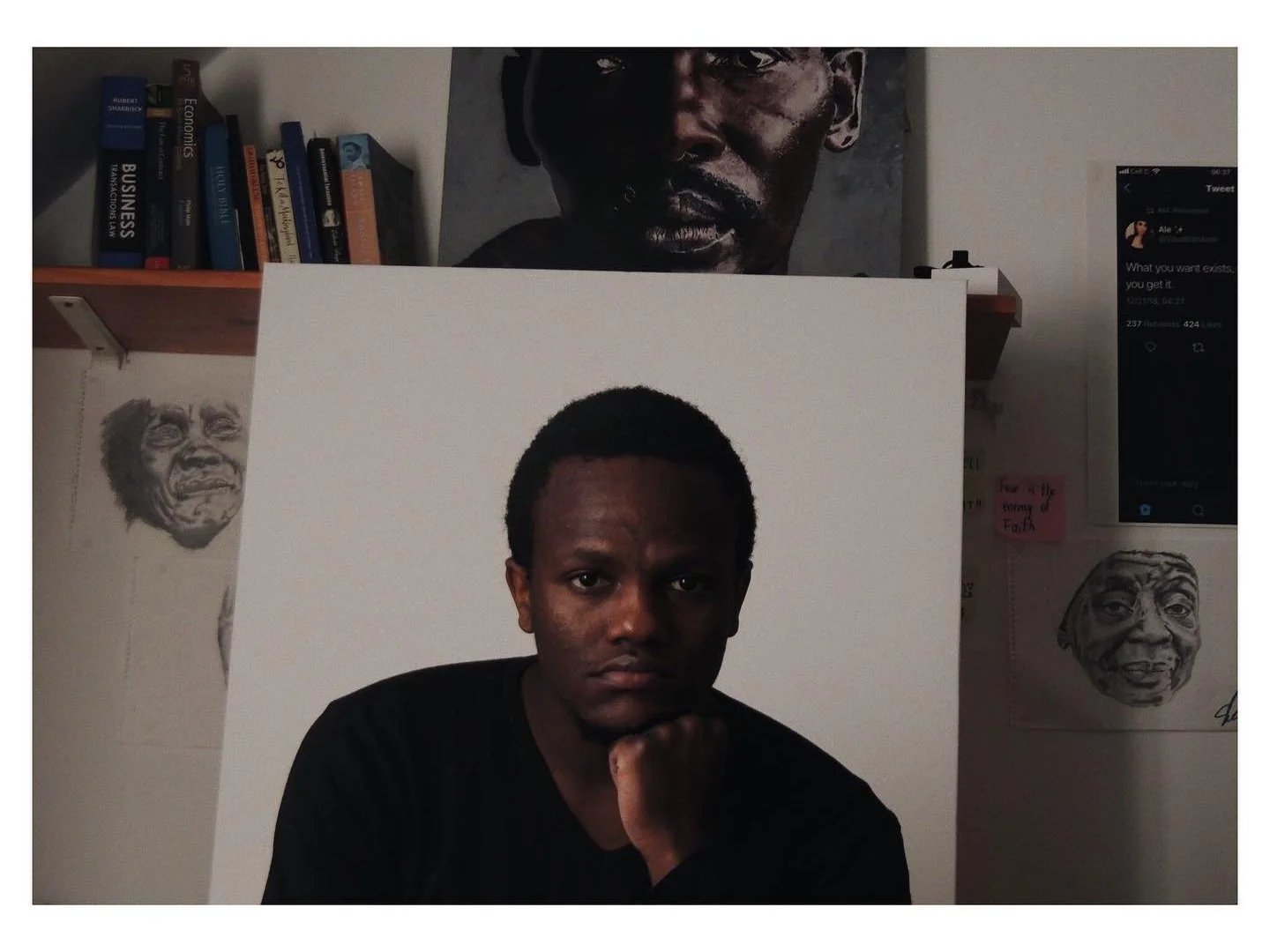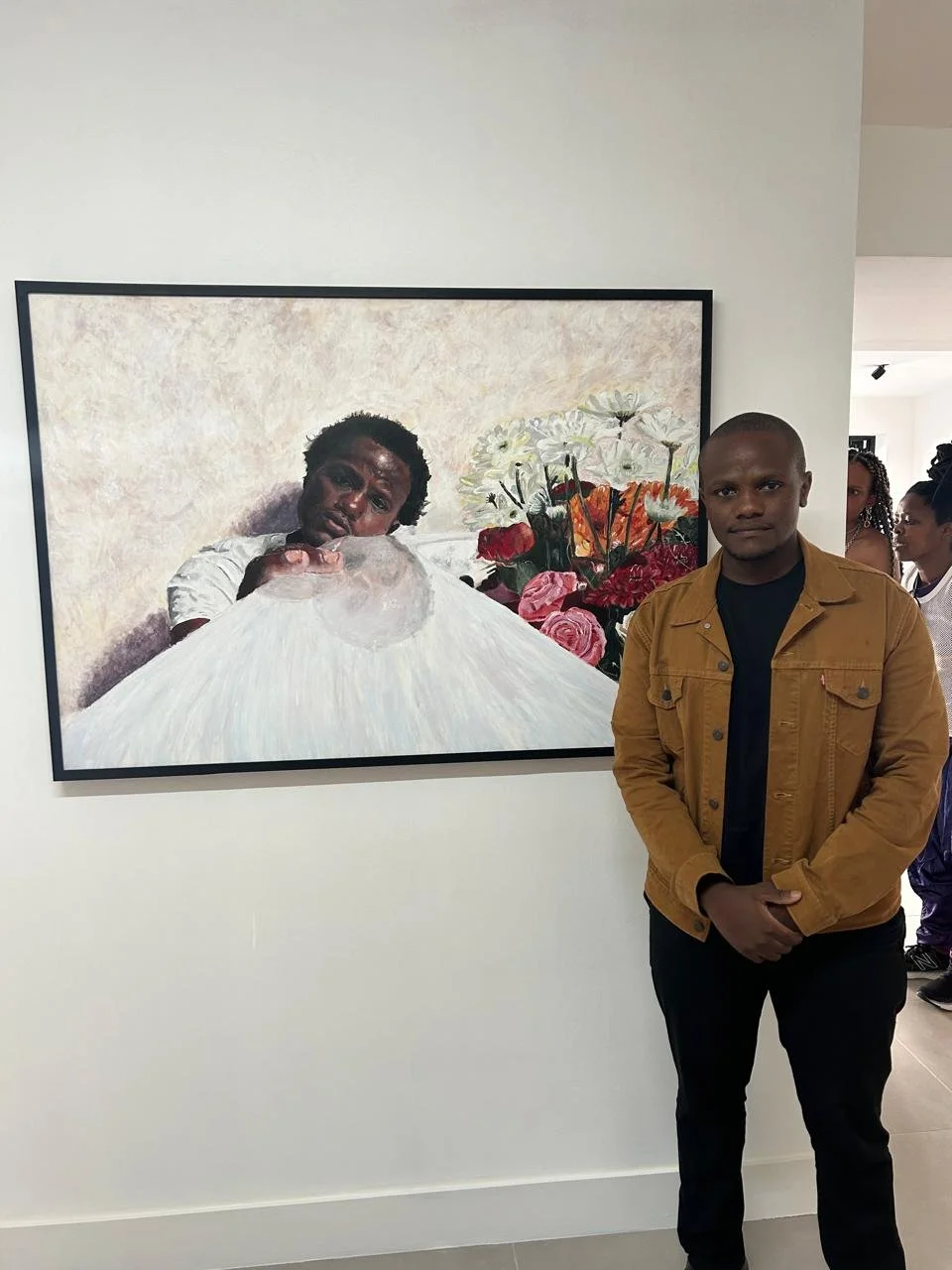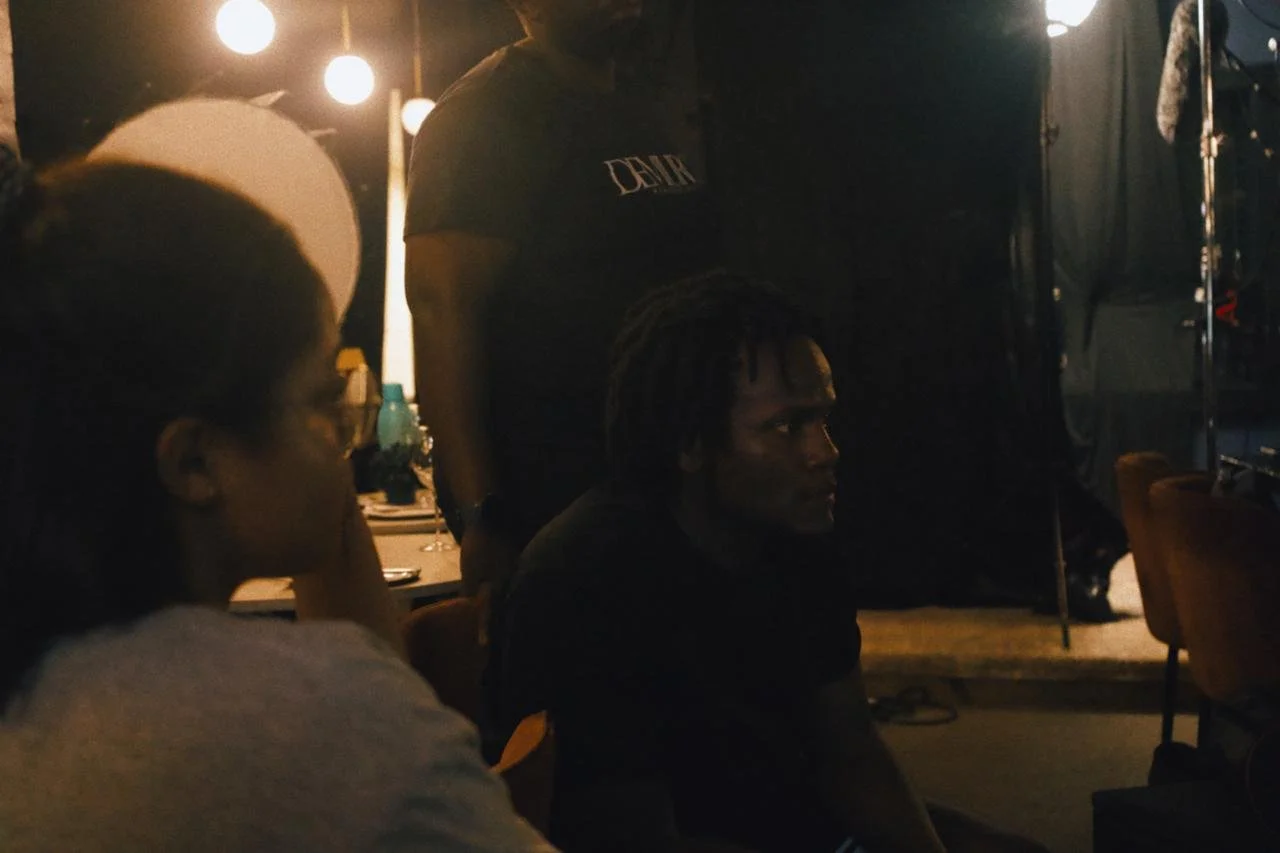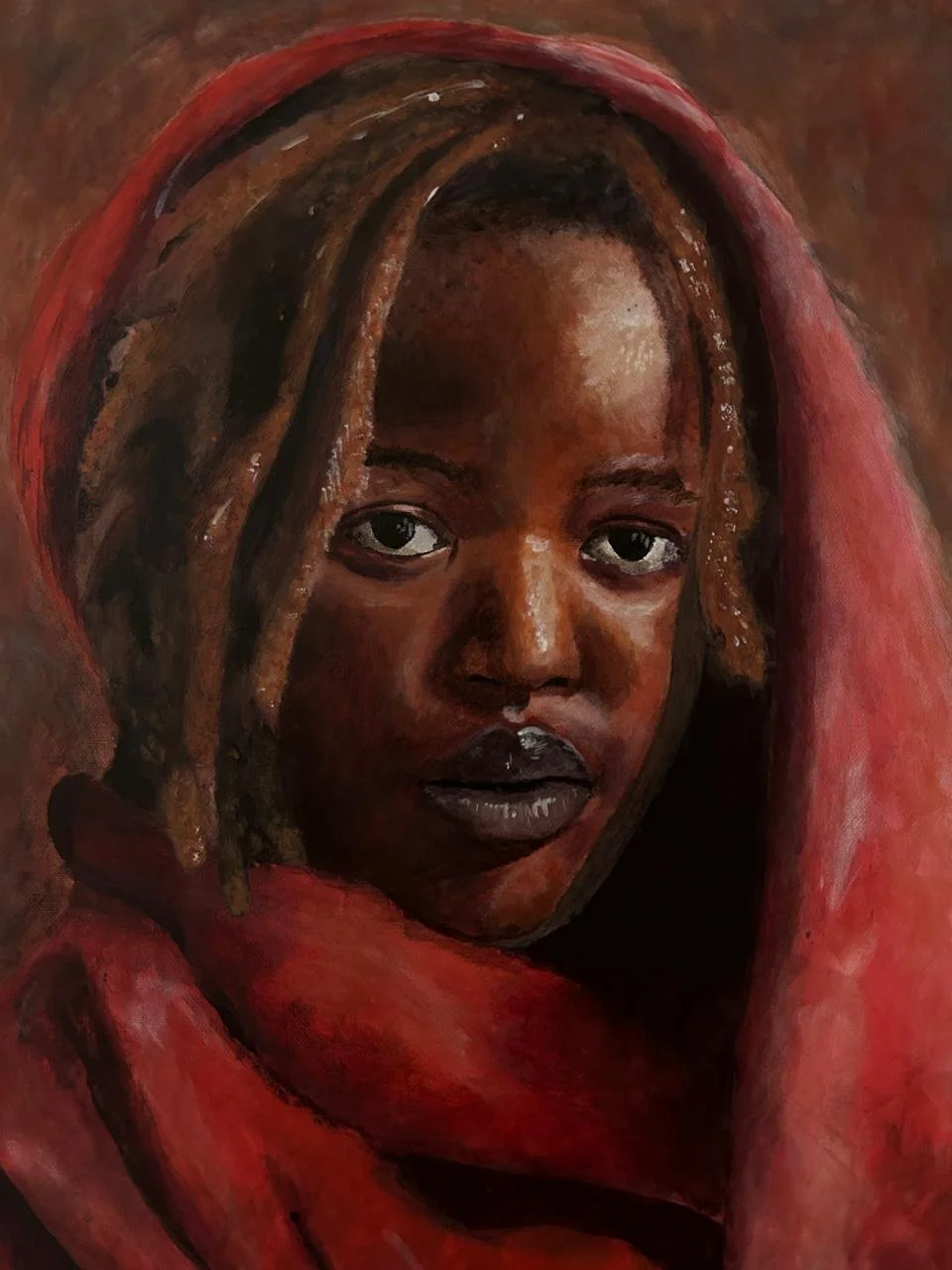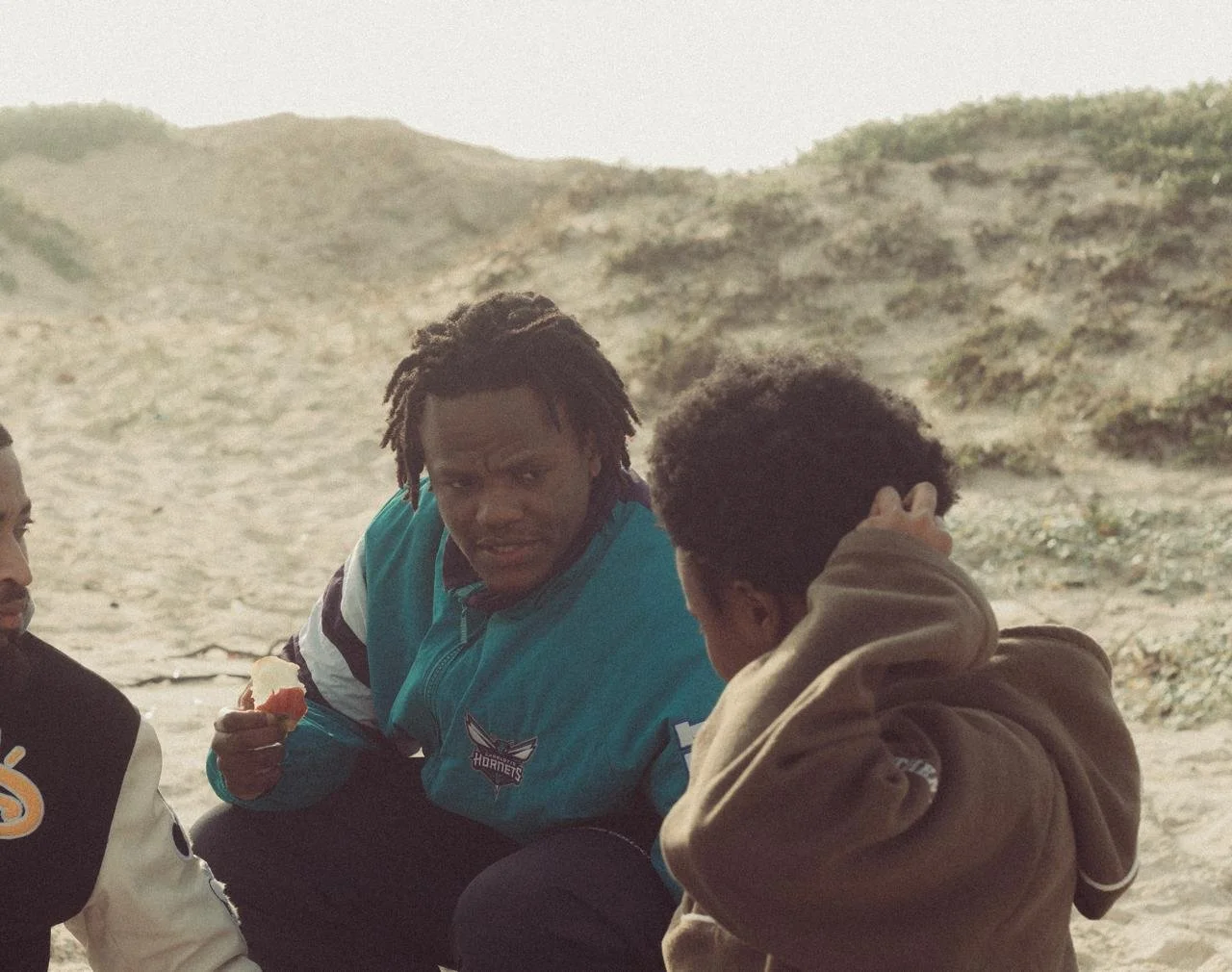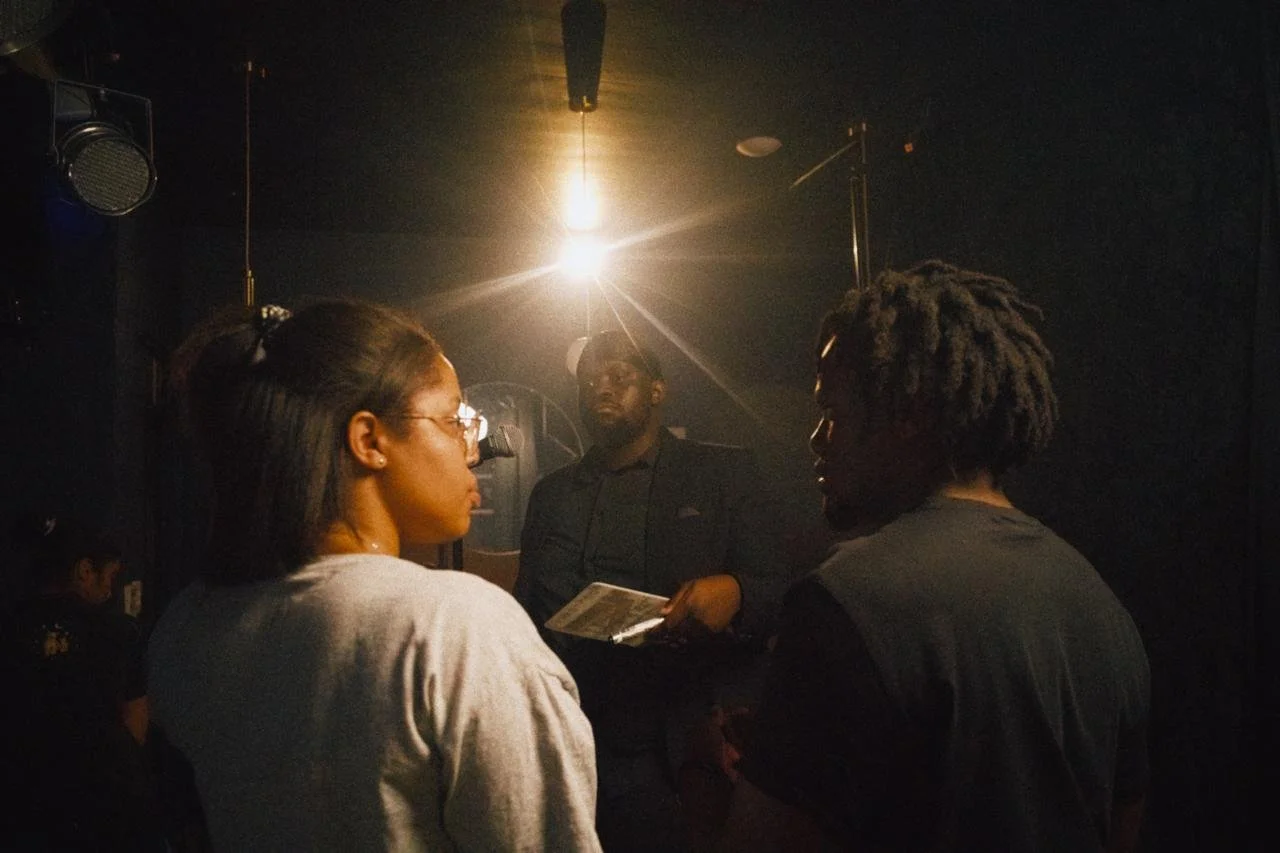Through the lens of Lindokuhle Skosana
The roads of life carry everyone on their own path. Your path crosses over countless others, and people can spend a day, a week, or a season on a path parallel to your own.
One of the things I enjoy about the work that we do is the opportunity to reconnect with people I’ve known before VERVE, people who I now see differently through the new perspective this journey into creativity has given me.
Lindokuhle is one of those people.
We met years ago when he was still in his first or second year at UCT, through a mutual friend that I worked with. Just a finance student at the time, and myself just a restaurant manager, we saw each other sporadically over a brief season in our lives, before our paths again diverged.
When I got back onto social media once VERVE started, Lindo came across my radar again, with his art, and his production company, Junehouse Films. I remembered seeing his sketches from way back, and being shaken by the depth that he could extrude using just a pencil and a piece of paper, and to see that he had developed into a fine artist and director, well I simply had to organise a catch up to learn more about his journey and his work.
We actually need a catch up bro, it’s been a while. What’s been happening since I last saw you?
Yoh bro…so much has changed. If I think back to 2019 or so my direction was very much about finance and ecos and such. With COVID, everything was just a massive detour.
I had always been within the arts, and I had always been an artist. But when you’re 16 or 17 that’s something that was always repressed. So that’s what I did - but when there was nothing else to do, I could do the things I actually loved to do.
That was to paint, and once you start to paint you get immersed into other things in the arts, which led me to film. Throughout the years I finished my degree with all the boring finance stuff. But then I studied again, this time focusing on my passion for film and for arts.
And it’s funny because like, passion projects became a career, and now I'm in stage one of building a career within those two worlds but it’s a step nonetheless.
Because of COVID, so much changed. It was a great shift, and so much changed.
So your whole creative journey started with Fine Arts?
Yeah man. It started with that thing from High School - you’re not the cool kid if you’re doing art.
So the sketching and drawing was something you’d do while hiding - keeping it lowkey because you still wanna belong with the guys. When you go to your room and you’re alone, that’s when you start drawing and you enjoy it. So that was me throughout.
With me, I always found that I’m a late bloomer, but I bloom nonetheless. So a lot of things take time to come out but it eventually becomes actualized and realised. So that was the case for me. It started off with sketching because that was the cheapest thing to do. I’d literally get a pencil and copy the things that I thought were cool. So I liked drawing cars, people’s faces and stuff.
As is the case with a lot of things with the arts, the more you do it, the clearer the idea gets. You start by copying your heroes. And then you do it again and add a little detail that you like. And you keep doing that, adding more of your own choices each time, until it's 50/50 your hero’s style + your own taste. Eventually, you end up trusting your taste so much that you follow through on it completely.
And then the goal is to get to the point where you’re just doing what you like. Like your idea, where your voice finally comes through your art. And it transcends - it’s not just when the painting or portraiture, it goes into film and other things.
So after finishing finance, how did you start pursuing fine art?
I remember the first day I went into Varsity. The first day I entered the lecture, I realised I had made a mistake.
It was one of those moments where I realised I had made that decision, but I didn’t have the finances to go up to my parents and tell them “this is not the way for me”, so I stuck through it. For four years, I did that.
And I remember at Varsity, they never checked the register. There’s like 300 people, so obviously they wouldn’t check. In every free gap or sometimes even when I had my own lectures, I’d go to film classes and lectures.
I did this for like four years. So technically, I got two degrees, but one was a stolen one because I never paid for it and did it because I was interested, and the other one I had to do because of exams and stuff. So I was just interested in this world, and it’s so consuming because one thing informs the other.
Whenever I was painting, I’d think of scenes, and it was just worlds that bounced from each other. That’s how it all began.
With the finance world, I stuck it out, I did my four years and I was so glad once it was over. That’s when I sat my parents down and told them it was all done, and I at least didn’t quit, but for post-grad, I wanted to take a complete detour. And they were understanding, which surprised me so much, and I was very grateful for that.
That’s when I went to AFDA to study film. With me, though, it always feels like I never do just one thing and that’s that. It’s always one thing and another thing on the side. Every time I was studying filmmaking, I was writing and directing. But it was always just for myself. I never had an audience, and I barely posted anything about my work.
I was always shy, and I thought it was trash. And I always looked up to people who had galleries with their work shown with all the big lights and stuff. Like damn! This would be nice, and I’m still on the way to try and get there. It’s something I always aspired towards, so while studying, I was painting and writing every day.
So how did you actually build up the courage to put your work out there?
I think I was an idiot. I was dumb brah!
You know what happens is like in the beginning when you’re starting out, the thing that you do is like the best thing that’s ever been made. There’s no one else in the world who’s going to make something this good. That was my way of thinking.
Obviously, with hindsight, the stuff I was making then is when I wonder what was that. I think delusion helps in that way. So, not being exposed to enough chills your judgement. It kind of protects you from what the real OG’s or your heroes are doing. You think that what you’re making is everything, and that’s important because it keeps you making that thing.
It doesn’t kill your confidence when you see other people’s work that is fantastic. It keeps adding fuel to your fire. You think this was great, so you’re going to continue to make another great thing. You keep lying to yourself until it actually works. It actually gets better. You never reach perfection, but you get close.
So yeah…the courage wasn’t courage. You know when you’re a perfectionist, you never wanna put anything out there. You think your friends won’t like this, so you put it to the side. But once you hone in on your craft, and you stop looking around, by choice or delusion, you keep on producing. And that was the case with the art and the writing.
Please don’t look at the old stuff, though!
From when I first saw your sketches years ago, I always thought there was this profoundness to it. Even looking at your art now, you seem to capture that same thing. Your portraiture looks like stills from a movie, but there’s an added layer of something to it. What goes into the art that you produce? Especially the self-portraiture, isn't that quite a process?
It’s a big process. Composition is such an important thing to me. I didn’t want to realise I was paying attention to it until I looked back at the patterns of the work that I was doing. So in relation to stills and artistry, I’d always obsess about where I’d position a person or the person that I’m painting. If it’s centre, lie centre. Or if it’s a little bit off centre, or I’m just showing the face or blank space, why am I doing all of these things?
There were a lot of references and influences from scenes that I would watch, where most visions were being considered before the positioning of characters within a frame. Now with painting, again it started in lockdown when I didn’t have any models. Firstly, I was too shy to ask people to pose for me, instead for a project I was doing. So I was like ‘you know what, I’m just going to paint myself’.
In the beginning, a lot of my work was on me, which is a weird thing. My style morphed from being a lot of realism, and now it’s merging into realism with a bit of abstract concepts that are coming up. I’d have to take photos of myself and position the camera in certain ways that would fit the same frame that I had envisioned. Then I’d have to stare at myself for fifty hours because that’s how long some of these paintings took. It’s very meditative, and it’s a weird kind of therapy.
It’s like looking in the mirror and you notice things that you never noticed before. All the little details. The little dimple that you thought you never had, the pimple here, and this is how you smile. You gain a certain empathy for yourself when you’re painting yourself repeatedly.
That then morphed into working with other people, capturing other people’s portraits. It’s quite profound because no two faces are the same. Never, never, never. The same face painted twice has a completely different context. Eyes play a big role. What the eyes are doing or what they’re saying gives all the context that you need.
That’s something I kept within all the artistic professions that I made. It started as me painting a photo because it looked cool, but it morphed into a thing of Why am I painting this? What am I trying to say with this image? The idea gets clearer for sure.
In so much as you started in self portraiture, and you’ve touched back on that numerous times in your artistry, do you feel like there’s something new that comes through each time you use that self portraiture technique?
Yeah, for sure. Well, every time I see old work, it’s like a photograph. It captures a moment in time. And because it’s realism, that’s actually what I was feeling when I painted this image.
That’s what I used to look like, because I obviously changed over time. So it captures a moment within my lifetime, and when I’m like fifty or sixty, still doing what I’m doing, that’s going to be like self-progression. It’s that thread that links all of the Lindo portraits, and that’d be interesting to see. It’s nice to have that moment be tangible.
But in terms of style, the style changes. I always describe my work as being inelegant. It’s not pretty work. It’s work that makes you stop and wonder why? You’ll think something, but it’s not my problem what you think. As long as it makes you stop to think and wonder.
That’s kind of the goal for me because that’s the visceral nature of the painting style that informs the reaction from and it’s need for the painting to not be perfect. It has to be lines or paint brushes that are visible. That’s my goal with the paintings.
Let’s talk about the film side of things. How was your experience at film school, coming straight out of a finance undergrad?
By the time I got into AFDA I was a lot older than the other guys - everyone else was still fresh out of high school. They were still trying to find themselves, but by the time I got there I was crystal clear on what I was there for. I knew what I wanted to get out of it so I was working harder than everybody else and making use of all the opportunities that were at my disposal.
Film school is a weird one. You can learn a lot by just jumping into the industry, but there is a lot more you can learn by going through the schooling. You need that education. I think you skip a couple of years by just having that formal education, even though being in the industry is more practical, because you’re learning a bit more deeply, you’re absorbing the knowledge. But I still advocate for film school.
As big as the industry is, it’s also a big ecosystem where the dynamics exist. At varsity, it’s much smaller. The same kind of tasks and relationships are pretty much the same, on a smaller scale. Obviously, school is school. Sometimes you like it, sometimes you don’t. But with film, to make high-quality work, there’s still a barrier of entry. A normal short film is going to be north of fifty thousand to a hundred thousand. That’s money that you don’t have when you're starting out.
So being in film school allows you to play and make mistakes, and allows you to learn from them. That was important. For me, going forward was the relationships that I made in school. Literally, being in film school is an audition for what’s going to happen when you graduate. Because we all work with each other, we all employ each other, and it’s one of those worlds where word of mouth vouching for each other plays a big role.
CVs and stuff are always important, but how you engage with people helps more. I met other people that I work with now, and I also met my business partner, Thabani Makanza. I remember the day we graduated was when we had to figure out what was next. We decided to start a production company on that day…well, maybe a couple of days after. That’s called June House Films by the way. And yeah, it’s been going quite well.
In terms of meeting the people, film school was everything for me.
What’s the journey been like with June House Films within the industry?
It’s been tough, hey. It feels like an industry that’s gatekept a lot. If you’re these new kids that are loud and are trying to make an impact, then they shut you down and tell you to stay in your place.
So there have been a lot of barriers. Just one gate after another just to get there. The goal for us is to sit at the table with the people who are experienced, and for us not to feel like the newcomers. So far, we are building a portfolio that can speak for us. And soon enough, you never know, we’ll be able to attract clients and tell stories that we want to tell. We’ve been doing that at a smaller scale, but month by month it’ll grow. It’s not easy, and I do not recommend this.
You know what it is? And I’m sure you see this. It’s easy to just put ‘CEO’ on your Instagram profile. It feels nice and it fills your ego, but the stuff that’s not glamorous and the actual work that needs you to sit down at your desk for ten hours every day for two years is not easy. But it’ll all pay off.
With June House Films, is there a specific ethos that you have? Is there a specific story that you’re attracted to or a type of work that you guys favour?
Yeah. Because the vision bearers of the company are myself and Thabani, there are differences in the stories we want to tell, but there’s also an overlap between the two.
I can speak for myself. The stories that I want to tell are always the unconventional ones. I find that in South Africa, there’s always an expectation of the celebate content that you find on Netflix and stuff. There’s that look and feel of stuff. It’s nice, it’s adjustable, and it’s entertaining. But I feel like there’s more that is not being shown.
I think my goal is that. My goal is to tell stories that I believe in, but to slightly deviate from what is expected. If you build it, the people will come. I always believe that. If you really write something that is of great quality, it has to exist for people to gravitate towards it. The opportunity to build the thing that people can look at and want to be a part of isn’t really there.
So my goal with the company is to do that. To be the outlier with the kind of stories that we tell and to then build a brand out of that. To show things that you never really see outside of the normal ecosystem of filmmaking.
With the stories that we’re telling, we find that they are stories that are intimate, yet universal. The more you tell a story that is as personal as possible - a story that is as personal as possible, one person set in one location, very specific - that’s when the story becomes universally liked. But if you try to stay on the surface and write something that everyone will like and is relatable, I think that’s a failure. So it's not about if it will resonate with the masses, but will it resonate with one person or one community.
That’s the goal, those are the stories we want to tell. The intimate stories that become universal because of how personal they are. Those are the stories that matter most.
Do you think that the language of film is dying out? Looking at a film as an art form, and more than just a spectacle - do you think that people still perceive that?
Yes and no.
Yes, in that the people who are in charge of funding are not film people but more business people. They care about the cheque and they care about the return on investment. So they’ll keep on pushing sequels and the non-original stuff. They’re simply banking on a franchise to get their money back. That’s the unfortunate part.
However, I’m still quite optimistic about it. I don’t think it’s a dying art in that way because it’s a swing. It goes one way, then another way. That’s going to keep going on for maybe the next couple of years.
There’s still going to be a hunger, a thirst, for real films. There’s still going to be a world where the independent filmmakers and the guys who really care about scores and visuals that aren’t really promoted in the big budget stuff are going to grow.
So, that’s why I say it’s a yes and no. Within that aspect, I’m always an advocate for all kinds of films being made. The bad ones and the good ones. All of them must be made, because it means that the world of film still exists. Even though it doesn’t look the way we want it to, it will eventually. It always does.
Especially African films, which I’m quite passionate about. That’s the bad Rom-Coms, the stuff that’s franchising, the great filmmaking where the filmmakers really care, the stuff that’s for money, the stuff that’s not for money, and the artistic avant-garde stuff. All of it must exist for me.
The success of one doesn't mean the failure of the other. It’s just a postponement in that light being shone on the work. It always comes to that light, and it always swings back and forth.
Someone told me today that the way we write here at VERVE is ‘hopeful’. We see potential for the topics and fields we cover.
And how can we not? With stories like Lindo’s, stories that so closely parallel our own, how can we not be inspired to keep plodding on this journey of documenting and archiving the creatives making waves in the scene. Stories that, as Lindo said, are so personal, yet they resonate with us. And if they resonate with us we can only hope that they will resonate with you too.
So many times now I’ve been inspired, awed, and encouraged by the people I’ve interviewed. New friends have been made, and old friends have become new again. This is the power of what we’ve set out to do.
So keep reading, and keep being inspired. One day you too will inspire others to set out on a creative journey of their own, and who know where their path will lead.

